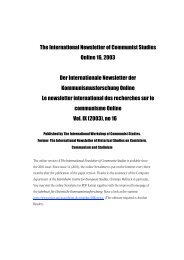VOL. XVI (2010), NO 23 - The International Newsletter of Communist ...
VOL. XVI (2010), NO 23 - The International Newsletter of Communist ...
VOL. XVI (2010), NO 23 - The International Newsletter of Communist ...
Sie wollen auch ein ePaper? Erhöhen Sie die Reichweite Ihrer Titel.
YUMPU macht aus Druck-PDFs automatisch weboptimierte ePaper, die Google liebt.
<strong>The</strong> <strong>International</strong> <strong>Newsletter</strong> <strong>of</strong> <strong>Communist</strong> Studies Online <strong>XVI</strong> (<strong>2010</strong>), no. <strong>23</strong> 36<br />
percentage points. Following the elections, the PCI took over the chairmanship <strong>of</strong> seven<br />
parliamentary committees, including the chair <strong>of</strong> the defense committee, and PCI-member<br />
Pietro Ingrao became President <strong>of</strong> the Chamber <strong>of</strong> Deputies. Similarly, a massive increase in<br />
membership up to 1.81 million members was recorded. Moreover, in 1976 the <strong>Communist</strong><br />
Party newspaper l’Unità became one <strong>of</strong> the biggest newspapers in Italy with 280.000 daily<br />
copies. <strong>The</strong> <strong>Communist</strong>s also succeeded in local elections.<br />
<strong>The</strong> Italian situation alarmed the U.S. administration in the early 1970s. <strong>The</strong> key security and<br />
foreign policy actors did not believe the Italian <strong>Communist</strong>s to be willing and able to become<br />
independent from Soviet influence. As a result <strong>of</strong> this negative perception <strong>of</strong> Italian<br />
Eurocommunism in the context <strong>of</strong> a potential communist participation in the government, the<br />
formation <strong>of</strong> a confrontational strategy in dealing with Italian communism, similar to the<br />
containment strategy <strong>of</strong> the postwar period, were implemented by the U.S. administration.<br />
Even after the election <strong>of</strong> James E. (“Jimmy”) Carter as U.S. president in 1976 there was<br />
little change in the attitude <strong>of</strong> the U.S. government.<br />
In contrast to the American strategy the Federal Republic <strong>of</strong> Germany established a<br />
cooperative strategy in dealing with Italian Eurocommunism. After first contacts between PCI<br />
and SPD politicians in the late 1960s, the executive committee <strong>of</strong> the Social Democratic<br />
Party <strong>of</strong> Germany (SPD) developed and implemented a long time secret strategy to support<br />
the reformers in the PCI around General Secretary Enrico Berlinguer on their way from<br />
Soviet orientated communism to Western European Social Democracy. Following the<br />
election <strong>of</strong> Willy Brandt as President <strong>of</strong> the Socialist <strong>International</strong> (SI) in 1976, the SI was<br />
incorporated into the strategy <strong>of</strong> cooperation with the Italian <strong>Communist</strong>s. While in the U.S.<br />
case the strategy in dealing with the Italian Eurocommunism was determined by the U.S.<br />
administration, the cooperative strategy <strong>of</strong> the Social Democrats in Germany could not be<br />
run by the state in the long term. An <strong>of</strong>ficial state cooperation with the largest communist<br />
party in the Western world would have lead immediately to massive negative consequences<br />
on a national and international level. <strong>The</strong>refore, the contact with the PCI took place in the<br />
form <strong>of</strong> a so called Nebenaußenpolitik at party level by the SPD.<br />
This study is primarily based on archival material in the three participating countries (in<br />
particular the National Archives and Presidential Libraries <strong>of</strong> Nixon, Ford and Carter in the<br />
United States, the Political Archive <strong>of</strong> the Foreign Office and the Archive <strong>of</strong> Social<br />
Democracy in Germany, the Fondazione Istituto Gramsci in Italy) and interviews with former<br />
politicians.














